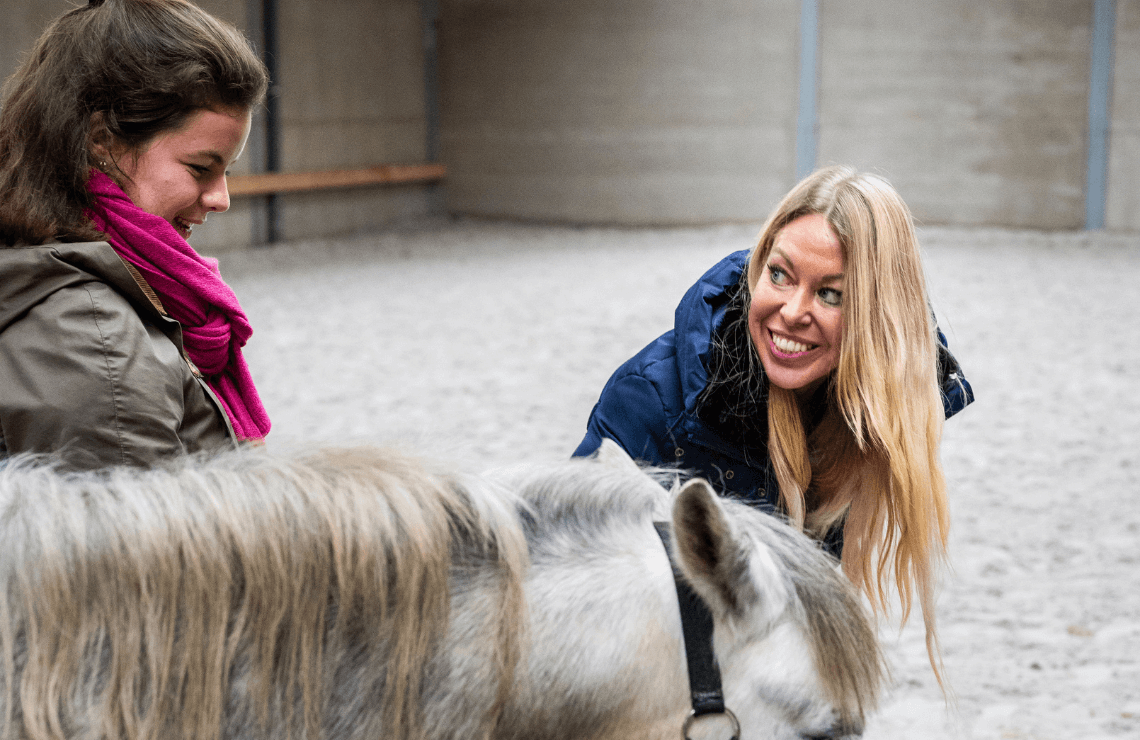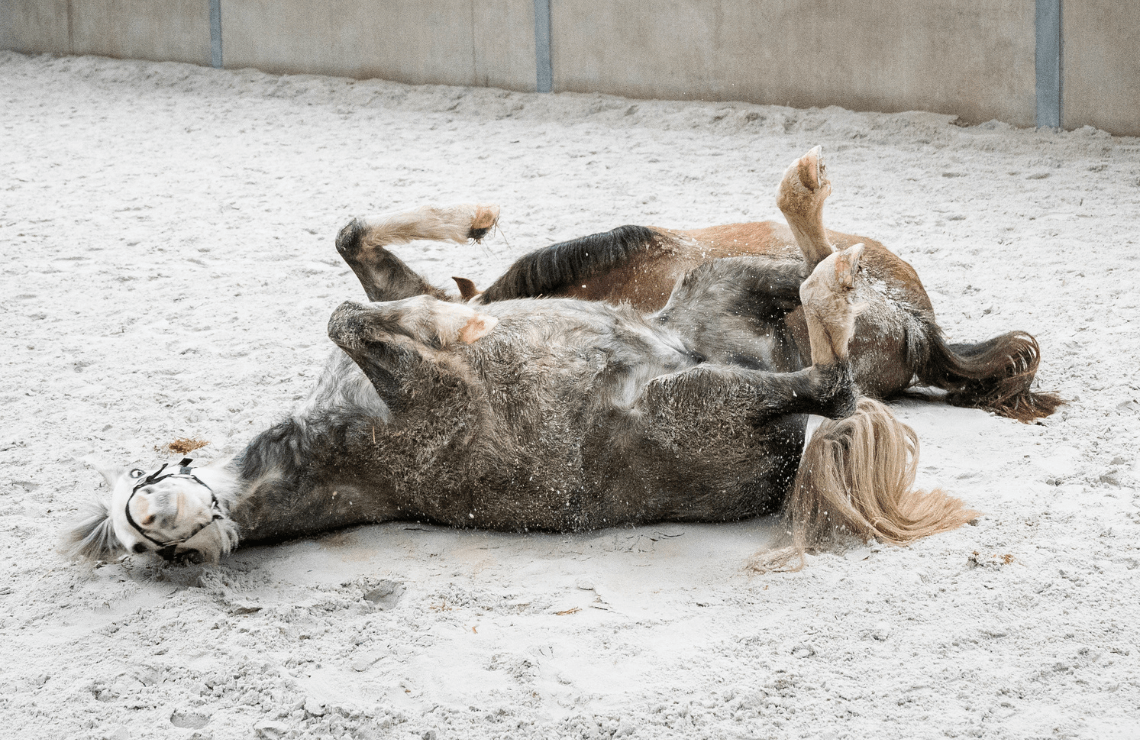How can you achieve personal growth in delegating? This was the central question that accompanied the Belgian Young Innovation Board (YIB) to a horse coaching session. What does a session like this involve? And, did they get what they hoped for?
‘We’re all going to try to move forward at the same time,’ says Lien Van Rechem, Public Business Manager, as she grips the rope of the horse beside her. ‘If there’s an obstacle, we’ll see what to do,’ she told her colleagues from the Young Innovation Board (YIB), lined up to the right of the gray horse.
They hold the other end of the rope that goes to Oasis, as the horse is called. The aim, under Lien’s inspiring guidance, is for the team to walk in a straight line with the horse to the other side of the arena. Lien takes the first determined step, Oasis and the others close behind. After a promising start, the horse abruptly halts. Cautiously, Lien pulls at the rope: ‘Come, horsey, come!’ But it’s clear that Oasis has no intention of budging at all. ‘I think he wants to play,’ says Lien, looking desperate.
You need to be safe
To the casual observer, it may seem like a coincidence that the horse, Oasis, gave up, but horse coaches Elke Van den Bossche and Henk Van ‘t Net know better. In Breendonk, Belgium, near the A12 motorway between Brussels and Antwerp, they organize horse-assisted coaching sessions for both companies and individuals under the name Grow&Change. ‘Horses are herd animals; that’s why they want to be with us,’ explains Henk, who started his career in IT, and has now spent 20 years in business coaching. ‘But they’re also flight animals, which means they will freeze or move away if they feel you’re not safe,’ he says, nodding to Oasis, who has moved quite a distance away. ‘How do horses know that? They deduce this from the triad of thinking, feeling and doing. If this triad is congruent, or in harmony, then the horse knows ‘this is safe’.
From consultant to manager
On this stormy Thursday afternoon, YIB, a tight-knit group of five colleagues who represent all TriFinance Belgium, TriHD and TriTechnology employees, receives an answer to a central question they have posed together. Lander Coene, Project Consultant CFO Services, says: ‘As young consultants, we are constantly growing in the company. Almost all of us have changed positions at some stage, and more and more responsibilities are being added to the mix. In other words, you’ve gone from a job where you did everything yourself to a position where you have to give orders to other people. I have to get used to that, as sometimes I find that I don’t want to give other people the tasks that I can do myself. You need to find the right balance between asking for help more often, having the courage to let go and trusting the people in your team. We discovered that we’re all looking for that a little bit, so our central question is: ‘how can you achieve personal growth by delegating?’

You also have to give the team confidence
Wouter Spitaels, Financial Institutions Project Manager: ‘For the last few months I’ve been working on a project where I’ve had to manage other people. Because I’m responsible for the end result, I felt I had to be in control at all times.’ As I walked with the horse, I noticed how this could also work against you. The horse started to buck a little because I was holding the rope too tightly. When I let out the rope a bit more, I immediately noticed an improvement. The challenge I face is trying to reassure the team. Only then will they walk over hot coals for you. Although this is not new information to me, I was reminded of it during the horse coaching session. ‘You learn a lot about yourself. I really gained from it on a personal level.’
"You quickly learn such a lot about yourself, and your role in a team."
"Everything improved when I started paying more attention to my team"
Lien van Rechem, Project Consultant: ‘I was amazed that horses can sense what is going on with people so well. I didn’t expect that. I thought you just had to tug the horse a bit to get it from point A to point B. The main thing I learnt from the exercise was that I didn’t take the team into account enough. Not only did the team notice, but so did the horse. It stopped walking, forcing me to think why this was happening. As soon as I started paying more attention to my team, things improved greatly. I’ve learnt to be confident but also allow myself to be vulnerable. As I’m in a management position for the first time in my career, I can use this in my work. As a newcomer, I’m sometimes insecure when I have to manage people, especially when they have 20 years more experience than me. I’ve learned to admit that I sometimes find it difficult to delegate, but that I also have to stay strong enough to lead.’
More attention to the team
During a two-hour session, YIB members are instructed individually to walk one of the horses around the arena with help from the rest of the team. ‘Just stand next to the horse,’ Elke tells Ellen Dumortier, TriTechnology Project Consultant. ‘What will you say to your team to make sure things go the way you want them to?’ Ellen thinks, letting Leonora, the horse, nibble at her hand. ‘We’ll walk together and then we’ll see,’ she says. But no matter what Ellen does. Leonora is not in the mood for a walk. Elke and Henk don’t judge the situation, but ask Ellen and the other team members questions to establish what is actually happening. ‘I’m too hesitant. Because I know and trust my team well, I concentrate more on the horse than on my team,’ Ellen reflects after fifteen minutes of trying. ‘“She will walk again. This time with more ‘You make progress if you let go of control’ confidence and attention to her team.” And this time, not only Leonora, but also Oasis started walking close to Ellen.

A horse reveals everything
In this way, the entire team quickly discovered what was preventing them from delegating well. They also learned how to delegate better in the future. Charlotte Dulait, Intake Lead at T&S Louvain-la-Neuve, concludes: ‘You can see that the horse immediately senses that something is going on.’ In my case, it was that I found it very difficult to let go. The horse exposed and reflected that, teaching me that it’s not a bad thing if something doesn’t work out once in a while. When I realized that, the horse suddenly started walking with me. The rest of the group nodded in agreement, adding, almost in chorus, that they really enjoyed this kind of coaching. As Charlotte puts it: ‘You quickly learn so much about yourself and your role in a team through the horses and the questions that Elke and Henk ask you. It makes you think, and now I realize that I’ll make progress if I let go of control more often. That’s a valuable lesson that I’ll take back to work with me.’
Related content
-
Reference case
A blend of (new) Payroll challenges for Indy at iO
-
Blog
Top TriHD reads of 2024: your favorite articles
-
Article
Tri For Impact: empowering people, enriching communities
-
Blog
Should L&D professionals be subject matter experts?
-
Blog
Should L&D experts put more effort into measuring ROI?
-
Blog
How to translate L&D efforts into learning?
-
Career at our Clients
Talent Acquisition Specialist
-
Career as Consultant
Expert payroll consultant
-
Career at our Clients
Payroll HR Officer | Dentius (Antwerpen Zuid)
-
Career as Consultant
Payroll consultant
-
Career as Consultant
HRBP consultant
-
Career as Consultant
Compensation and benefits consultant